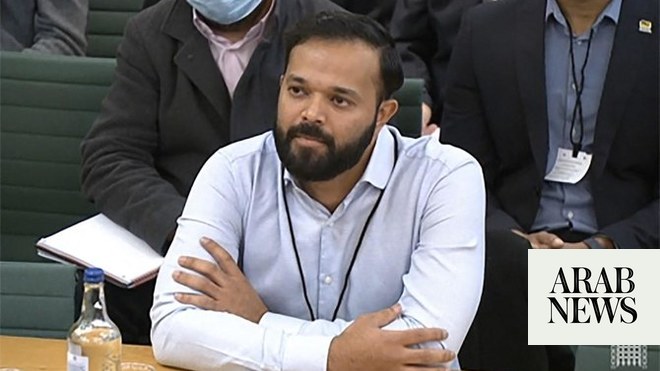
Three years after Azeem Rafiq first brought his allegations to Yorkshire, the club admitted on Friday that he had been a victim of “racial harassment and bullying” while he was a player at the county.
A summary of a report by an independent panel following an investigation into the allegations was published on Friday. The long-awaited findings of the report upheld seven of the 43 allegations brought by Rafiq but was unable either to prove or to disprove institutionalised racism due to insufficient evidence.
Roger Hutton, the chairman of Yorkshire, issued a full apology on behalf of the club. “I wish to extend my sincere, profound and unreserved apologies to Azeem and to his family.”
The club said they were unable to release the full report because of legal reasons, “in relation to privacy law and defamation”.
That Yorkshire chose to release the findings of the independent panel investigating the allegations on the first day of the Old Trafford Test, and shortly after it had been called off, was just the latest chapter in a tale of obscuration which has clouded the legal process.
A statement from Rafiq’s representatives damned the timing of publication: “We note that Yorkshire has confirmed Azeem was the victim of racism and bullying during his two spells at Headingley.
“However, we must highlight the atrocious way this process continues to be handled. Azeem was not given any notice of this morning’s statement – he received a copy only a couple of minutes before the media.
“Azeem and his team are not in a position to properly understand the club’s conclusions and how they reached them, because Yorkshire has not provided a copy of the report. This is clearly unacceptable and an abuse of process. What is clear is that Yorkshire admits racism and bullying has taken place on many occasions, yet won’t accept the obvious – that this is an institutional problem.”
The seven allegations upheld by the report were:
When Azeem Rafiq was playing junior cricket for Yorkshire, he was not provided with halal food at matches. (This has now been rectified.)
Prior to 2010 the panel found that there were three separate incidents of racist language being used by former players which were found to be harassment on the grounds of race.
Before 2012 a former coach regularly used racist language.
During his second spell at Yorkshire between 2016 and 2018 there were jokes made around religion which made individuals uncomfortable about their religious practices.
During his second spell at the club, a former player made references to Rafiq’s weight and fitness that amounted to bullying.
In August 2018, when Rafiq raised concerns of racism, there was a failure by the Club to follow its own policy or investigate these allegations.
That on a number of occasions prior to 2018 the Club could have done more to make Muslims more welcome within their stadiums and should have dealt better with complaints of racist or anti-social behaviour within those stadiums.”
The enquiry spoke to 26 witnesses and had written responses and email evidence from others. Many, though, declined to be interviewed, which “impacted on its ability to make conclusive findings one way or another,” and the majority of the allegations were not upheld due to insufficient evidence.
The ECB, which has not received a full copy of the report, hinted at considering further action against Yorkshire.
“No one should have to experience racism or discrimination in cricket,” said Ian Watmore, the ECB chairman, “and it is very concerning that the independent panel has upheld a number of allegations and concluded that, historically, Azeem Rafiq was the victim of racial harassment and of bullying during his time at Yorkshire.
“It is clear that the game owes him an apology and we are happy to offer that apology to him. There is simply no place for racism in cricket, and what Azeem experienced was unacceptable. The ECB has only seen the statement and summary report for the first time today, so we will now examine the contents in detail to decide what further action is required.”
The panel made a number of recommendations for Yorkshire to act on, around policies, training, recruitment, community and wider engagement, culture, monitoring investigation and action and leadership. It concluded that: ‘The panel was mindful that there are substantial number of recommendations that are large for a business of the size of YCCC. The panel expressed its hopes however that this will be seen as an opportunity for YCCC to become a beacon of true inclusivity and to foster a culture of excellence in the space.”
Julian Knight MP, chairman of the Department for Digital, Culture, Media and Sport committee, which on Wednesday called for the report to be made public, welcomed publication but said: “It is concerning that YCCC was not initially willing to publish its findings and had to be pressed into doing so. Equally concerning is the lack of genuine contrition in YCCC’s statement.
“We now know that among the allegations upheld was harassment on the grounds of race following incidents of racist language used by former players and it being ‘regularly used’ by a coach. We need to know what action will be taken against those individuals involved. It is critical that YCCC acts on recommendations made by its investigators and is seen to do so with the utmost transparency and speed.”
The Professional Cricketers’ Association said in a statement that it “applauds Rafiq and the great courage he has shown in speaking out about his experiences”, adding: “There is simply no place for racism in cricket, and what Rafiq experienced was unacceptable and the game owes him an apology.”












